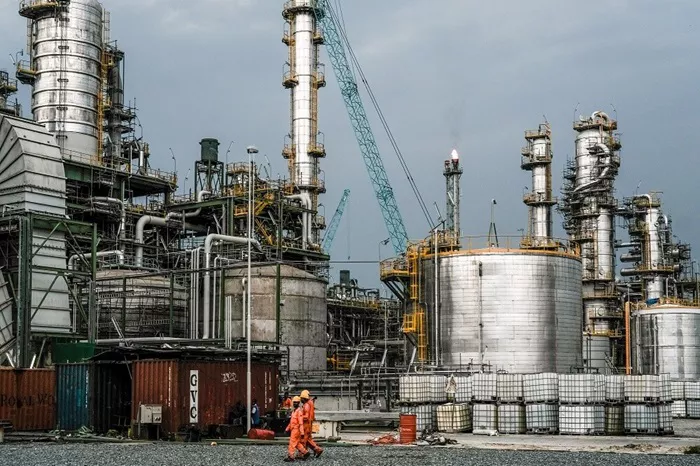The Dangote Oil Refinery has started processing petrol after recent delays attributed to crude oil shortages. Devakumar Edwin, a vice president at Dangote Industries Limited, confirmed that the Nigerian National Petroleum Company (NNPC) Ltd, the country’s sole petrol importer, will exclusively buy the refinery’s petrol.
This development follows a statement from the NNPC revealing serious financial difficulties, including substantial debt to petrol suppliers, which has raised concerns about the sustainability of Nigeria’s fuel supply.
The $20 billion Dangote Refinery, situated on the outskirts of Lagos and established by Nigerian billionaire Aliko Dangote, commenced operations in January. Initially, it produced diesel and jet fuel. With a daily capacity of 650,000 barrels, the refinery is anticipated to significantly lessen Nigeria’s dependence on imported oil products.
“We are testing the product (petrol), and it will soon start flowing into the tanks,” Edwin stated. However, he did not provide a specific timeline for when the petrol would be available locally. Edwin noted that if local demand does not meet expectations, the refinery might export the petrol, similar to its current practices with aviation jet fuel and diesel.
The introduction of petrol from the Dangote refinery is expected to mitigate some of the supply issues faced by the NNPC. Since January, the NNPC has accumulated $6 billion in debt to oil traders, impacting its capacity to fulfill domestic fuel needs. This debt has contributed to persistent fuel shortages and rising prices since July.
Despite being Africa’s largest oil producer, Nigeria imports nearly all its fuel due to the long-standing neglect of its national refineries. The Dangote refinery’s entry into petrol production is viewed as a crucial step toward addressing this enduring issue.
In contrast to its operational challenges, the NNPC recently announced a record-breaking net profit of ₦3.297 trillion for the financial year ending December 2023. This represents a 28% increase from the previous year’s profit of ₦2.548 trillion. The company also declared a substantial final dividend of ₦2.1 trillion.
On Sunday, NNPC’s Chief Corporate Communications Officer Olufemi Soneye issued a statement acknowledging the reports of significant debt obligations. The statement emphasized that the financial strain is putting considerable pressure on the company’s operations, potentially threatening its ability to maintain a consistent fuel supply.
Despite these challenges, NNPC reaffirmed its commitment to ensuring national energy security, as mandated by the Petroleum Industry Act (PIA). The company stressed its dedication to fulfilling its role as the supplier of last resort, despite current financial pressures.
Related topic:
How Is Gasoline Made From Crude Oil?

